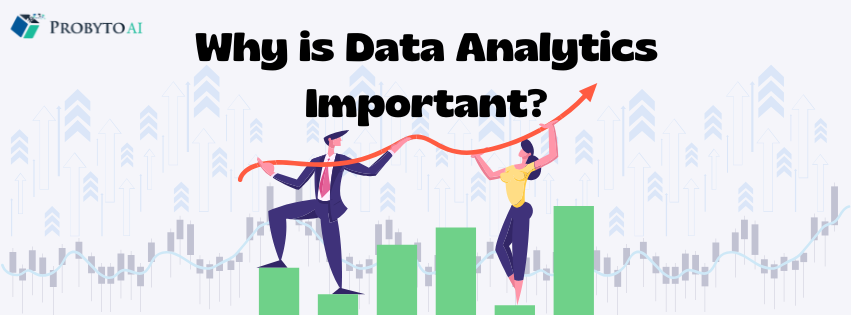Why Data Analytics is important in Businesses?
Data analytics has immense potential in the field of business, as it provides insights to companies to make informed decisions, optimize processes, and gain competitive advantages. One can understand how data analytics can benefit to businesses:
1. Data-Driven Insights
Data analytics enables businesses to collect, process, and analyse large volumes of data. This leads to better insights into customer behaviour, market trends, and performance, allowing for more accurate and informed decisions. Predictive models use historical data to forecast future trends, helping businesses plan effectively, minimize risks, and optimize resources to prepare the future strategy.
2. Personalization
With data analytics, businesses can understand their customers preferences and tailor products, services, and marketing campaigns to meet individual needs. This leads to improved customer satisfaction and loyalty. By analysing customer data, businesses can segment their audience based on various factors like demographics, behaviour, and preferences. This enables targeted customers and marketing strategies that increase conversion rates towards right direction.
3. Process Optimization
Data analytics can identify inefficiencies in business processes, helping companies streamline operations, reduce waste, and improve overall efficiency. Analytics can optimize supply chains by predicting demand, monitoring inventory levels, and identifying potential bottlenecks, ensuring that businesses maintain smooth operations and avoid overstocking or stockouts.
4. Cost Control
By analysing spending patterns and identifying inefficiencies, businesses can reduce costs in areas like procurement, production, and marketing. Data analytics helps businesses analyse competitor pricing, customer behaviour, and market conditions, leading to more effective pricing strategies that maximize profit while remaining competitive in the similar domain.
5. Fraud Detection
Advanced analytics can help detect fraudulent activity in real-time by identifying suspicious patterns or anomalies in data. Businesses can assess risks in various areas, such as financial investments, market conditions, and compliance, allowing them to mitigate risks.
6. Campaign Performance
Analysing marketing campaign data helps businesses understand what works and what doesn’t. It enables them to adjust strategies to maximize return on investment (ROI). Using natural language processing (NLP) and sentiment analysis, businesses can analyse customer feedback from social media, reviews, and surveys to understand public opinion and refine their marketing approach.
7. Trend Identification
Data analytics helps businesses identify emerging trends, allowing them to innovate and develop new products or services that cater to evolving customer needs. By analysing customer feedback, businesses can gain insights into product performance and areas for improvement, leading to better product development or service requirement as per business needs.
8. Market Intelligence
Data analytics helps businesses stay ahead of competitors by continuously monitoring market trends, customer preferences, and competitor performance. This enables timely strategic decisions to capitalize on opportunities or address challenges. Companies can use data to benchmark their performance against industry standards and competitors, identifying areas where they excel or need improvement.
9. Talent Acquisition
Data analytics can streamline the recruitment process by analysing candidate data, improving hiring decisions and sustainability of human resources by identify factors contributing to turnover and implement strategies to retain top talent.
10. Scalable Solutions
As businesses grow, data analytics can help scale operations efficiently, optimizing resource allocation and helping manage larger datasets. Analytics can assist businesses in assessing national and international markets, helping them understand local demand, regulations, and customer behaviour to support successful expansion strategies.
11. Compliance Monitoring
Businesses can use data analytics to monitor and ensure the compliances with industry regulations, reducing the risk of legal issues and fines. Automated analytics tools can help businesses streamline auditing processes, ensuring accurate reporting and better internal control systems.
Conclusion
Data analytics has the potential to revolutionize the way businesses by improving decision-making, optimizing processes, enhancing customer experience, and driving innovation. By leveraging the power of data, companies can stay competitive, reduce costs, and position themselves for a long period with rising trend.


